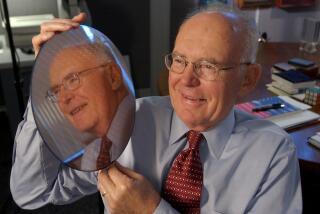Sun Microsystems Loses Another Key Executive
- Share via
SAN JOSE — In another sign of a brain drain at Sun Microsystems Inc., co-founder and renowned futurist Bill Joy announced Tuesday that he was leaving the network computing company to pursue other interests.
Joy, who has been dubbed the “Thomas Edison of the Internet,” was one of the people behind the famed Unix operating system that put Sun on the map and also helped develop the Java software that forever changed computer networking.
“For 21 years, I’ve enjoyed the opportunities for innovation provided to me at Sun, but I have decided the time is now right for me to move on to different challenges,” he said in a statement.
Scott McNealy, another Sun co-founder who is the company’s chief executive, praised Joy’s work.
“Bill will continue to be an inspiration to all innovators,” McNealy said in a statement. He made no mention of Joy’s departure during a speech at a conference Tuesday in San Francisco.
In interviews, the 48-year-old Joy said he might start a company of his own.
Joy won a following far beyond the engineering community with his meditations on the future, such as a Wired magazine article in which he argued that technology could endanger humanity’s survival.
“It would be hard to understate his importance to the Internet,” said Jean Bozman, vice president of research at International Data Corp. “You can see it as a departure of a key figure from Sun as far as the history, but as far as the day-to-day operations of the company, you would have to say it has less effect.”
In recent years, Sun has not been short of ideas but has had trouble persuading the marketplace to adopt them. Its sales have plummeted, and in just more than a year it has lost several key executives, including President Ed Zander.
Sun’s sales problems stem not only from the weak economy, in which companies are spending less on high-tech infrastructure, but also the emergence of systems built with low-cost and increasingly powerful hardware and software. Sun only recently has started selling low-cost servers running Linux, a free version of the Unix operating system.
As a graduate student at UC Berkeley in the 1970s, Joy was a leading developer of a Unix variant that became known as the Berkeley Software Distribution. After he helped form Sun in 1982, he was pivotal in developing Solaris, another Unix variant, and Sun’s Sparc microprocessor architecture.
Sun’s Unix server performed almost as well as IBM mainframe computers costing as much as five times more.
Joy helped develop Java, which is software that lets one program run on different machines, from home PCs to mobile phones. He also was involved in more recent improvements, such as letting computers share workloads and allowing the peer-to-peer networks made popular by Napster.
Those innovations were intended to let almost every object in the world join the Internet and do so without opening security loopholes that plague the Web.
“If there is one mistake I made,” Joy said, “it is to overshoot the market.”
Joy, who works and resides in Aspen, Colo. -- after leaving California’s Silicon Valley for peace and quiet -- said he might turn his attention to software that would make computer networks more secure, an interest for most of his career.
“If we look at the Net today, we can see it’s very insecure and under attack,” he told Bloomberg News.
Joy also said he’s considering a project or two with friend and venture capitalist John Doerr, a partner at Kleiner Perkins Caufield & Byers, which invests in computer-related start-ups.
“I’d like to design interesting things that make a real contribution and something that no one else is doing,” he said.
In recent years, he has become a lightning rod of opposition to the notion that all scientific progress is good. In April 2001, he warned in Wired magazine about the potential consequences of the rapidly developing and converging fields of nanotechnology, genetics and robotics. The piece was called “Why the Future Doesn’t Need Us.”
Joy’s duties will be handled by Greg Papadopoulos, Sun’s chief technology officer.
Shares of Sun closed at $4.11, down 13 cents, Tuesday on Nasdaq.





